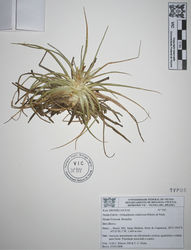Lapanthus vidaliorum
| Notice: | This page is derived from the original publication listed below, whose author(s) should always be credited. Further contributors may edit and improve the content of this page and, consequently, need to be credited as well (see page history). Any assessment of factual correctness requires a careful review of the original article as well as of subsequent contributions.
If you are uncertain whether your planned contribution is correct or not, we suggest that you use the associated discussion page instead of editing the page directly. This page should be cited as follows (rationale):
Citation formats to copy and paste
BibTeX: @article{Louzada2012PhytoKeys17, RIS/ Endnote: TY - JOUR Wikipedia/ Citizendium: <ref name="Louzada2012PhytoKeys17">{{Citation See also the citation download page at the journal. |
Ordo: Poales
Familia: Bromeliaceae
Genus: Lapanthus
Name
Lapanthus vidaliorum (O.B.C. Ribeiro & C.C. Paula) Louzada & Wand. comb. nov. – Wikispecies link – IPNI link – Pensoft Profile
Notes
When Orthophytum vidaliorum was described, Ribeiro and Paula (2010)[1] discussed its morphological relationship with Orthophytum itambense. It was emphasized that these species share similar habitat, plant size, leaves, inflorescence and flower structure. Moreover, they state that Orthophytum vidaliorum is also closely related to Orthophytum supthutii which was recently synonymized under Lapanthus duartei. In the same article the authors also mentioned that Orthophytum vidaliorum could be included in a different and unpublished genus proposed by Louzada (2008)[2] in his master’s thesis, which later was validly published under the name Lapanthus by Louzada and Versieux (2010)[3].
Besides, some morphological characters such as the rosette shape, the morphology and size of the leaves and the size of the flowers support the decision to include Orthophytum vidaliorum under Lapanthus.
| Character | Lapanthus vidaliorum | Lapanthus duartei | Lapanthus itambensis |
|---|---|---|---|
| Leaf-blade indument | glabrous | lepidote | lepidote |
| Inflorescence branching | simple | compound | pseudo-simple |
| Petal length | 2.5–2.6 mm | 2.8–3.8 mm | 4.1 mm |
| Petal color | greenish-yellow | orange | white |
| Petal appendages | obdeltoid | lanceolate | lanceolate |
Distribution
Lapanthus vidaliorum occurs in the southernmost part of the Espinhaço Range, in an iron–rich region called Quadrilátero Ferrífero (Iron Quadrangle) in the Brazilian state of Minas Gerais. Although it occurs in an iron–rich area, Lapanthus vidaliorum was found inhabiting quartizitic–sandstone rocky outcrops (Ribeiro and Paula 2010[1]) The present combination extends the genus distribution approximately 120 km southward (Fig. 3).
Conservation
Lapanthus vidaliorum is an endangered species, known only from the type–population, which is small in number of individuals, being about 3.5 kilometers from the iron ore mine Capanema and surrounded by an Eucalyptus plantation. Therefore, according to IUCN (2001)[4] criteria this species is considered critically endangered (criteria B2a).
Taxon Treatment
- Louzada, R; Wanderley, M; 2012: A new combination in Lapanthus (Bromeliaceae) PhytoKeys, 17: 63-68. doi
Other References
- ↑ 1.0 1.1 Ribeiro O, Paula C (2010) A new species of Orthophytum (Bromeliaceae, Bromelioideae) from Minas Gerais, Brazil. Brittonia 62 (2): 145-148. doi: 10.1007/s12228-009-9105-9
- ↑ Louzada R (2008) Taxonomia e citogenética das espécies de inflorescência sessile do gênero Orthophytum Beer (Bromeliaceae). Master Thesis, Instituto de Botânica, Brasil.
- ↑ Louzada R, Versieux L (2010) Lapanthus (Bromeliaceae, Bromelioideae): a new genus from the southern Espinhaço Range, Brazil. Systematic Botany 35 (3): 497-503. doi: 10.1600/036364410792495908
- ↑ International Union for Conservation of Nature and Natural Resources – IUCN (2001) IUCN Red List Categories and Criteria, Version 3.1. http://www.iucn.org
Images
|


